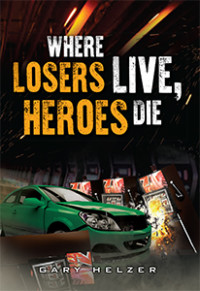Title: Where Losers Live, Heroes Die
Author: Gary Helzer
Publisher: BookVenture Publishing
ISBN: 9781640694170
Pages: 227
Genre: Contemporary Fiction
Reviewed by: Rae Capri
Pacific Book Review
From the very first page of Where Heroes Die, Losers Live, readers will get the perspective of two soldiers in the middle of a warzone, experiencing their confidence, yet unimaginable fear they share. Attempting to deter the attention of the enemy so they can assist their fellow team members to safety, seemed more than a simple task. The writing style of author Gary Helzer invokes the feeling of worry, panic, and concern for the soldiers in this scene, creating suspense in having readers wondering if they’ll make it out alive. By providing very descriptive details of the current characters and their movements, Helzer leaves no room for any form of confusion, which is a very impressive writing technique.
There were several characters that reappear throughout the book. Hans “Cowboy” Metzger, our protagonist, is one whose entire life we learn about piece by piece. We are told a lot of background information about his childhood, his purpose of joining the Army, his relationships with others; as well as his future hopes and dreams. Being told the story through his eyes develops a serious bond for the readers’ relationship with his character. One thing I liked in particular about Cowboy was he is a ‘quick on his feet’ thinker, a skill many people don’t have. He was able to come up with quick answers that were both logical and reasonable, which came in handy on quite a few occasions.
The author Gary Helzer, emerges us into a deeper emotional connection with Cowboy as we witnessed his continuous suffering of loss. This situation might be interpreted by the readers as what a loser must feel like, based on the amount of loss he has faced. He made his point nearing the end of the book that correlates with the title, about innocents dying while those who felt they didn’t deserve to live are still alive.
On page 95, Cowboy’s best army friend, Pete Saran, clearly expressed how he felt about the Army and what he believed they were fighting for. Pete was proud to wear the Army uniform until Vietnam, as he was assuming they were fighting for freedom of the people. Instead, “we were fighting, killing, and being killed so that the United States’ politicians, airplanes, ammunition, bombs, and gun factories could get fat. Vietnam is a rich man’s war.” This was a very brave statement from Pete because it may very well be a relatable feeling to our vets in real life.
I enjoyed reading this book yet one thing which made my reading experience a bit challenging was the amounts of minor overlooked editing issues. This might actually turn off many readers, but if you’re able to interpret what’s written to the best of your ability, you’ll grasp the concept of the story. After another thorough editing process, I would highly recommend this book to anyone who can relate to hardships in life in hopes they’ll gain the courage to improve their own lives.


